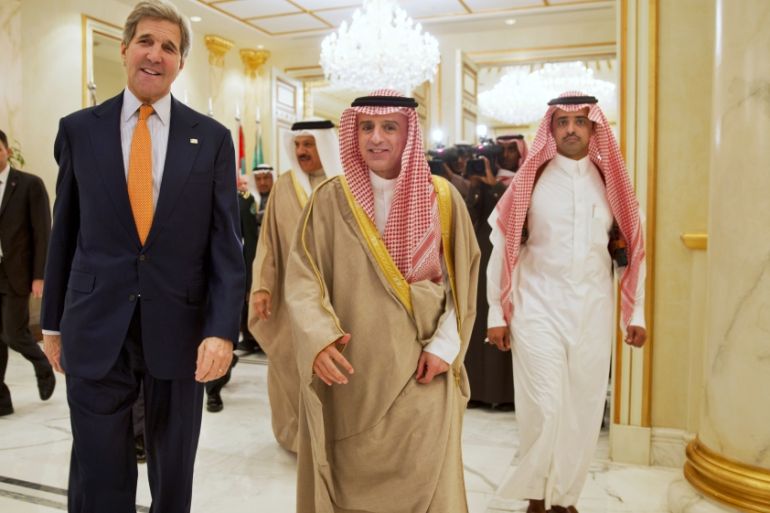US reaffirms support for Gulf Arab allies in Iran row
Secretary of State John Kerry seeks to calm concerns of a thaw in relations with Tehran during visit to Saudi Arabia.

US Secretary of State John Kerry on a visit to Saudi Arabia has sought to curb concerns from Gulf Arab allies over an apparent thaw in relations between the United States and Iran.
Kerry spoke on Saturday in Riyadh after meeting his Saudi counterpart Adel al-Jubeir and other foreign ministers from the six-nation Gulf Cooperation Council.
He also held talks with Saudi’s King Salman and the monarch’s son, Deputy Crown Prince Mohammed bin Salman, who is also the defence minister.
“The United States remains concerned about some of the activities that Iran is engaged in in other countries,” Kerry told reporters, citing as an example Iran’s “support for terrorist groups like Hezbollah” in Lebanon.
Saudi Arabia and its Gulf neighbours perceive a lack of US engagement in the region, particularly in the face of what they see as Iran’s “interference” in Yemen, Syria, Lebanon and elsewhere.
Those sentiments reached a new level after the historic international deal which this month lifted crippling economic sanctions on Iran in return for a scaling back of its nuclear capabilities.

Kerry has long sought to calm concerns among his Gulf allies about the overtures to Iran, one of the Middle East’s leading powers whose relations with its regional rival, Saudi Arabia, have worsened this month.
Saudi Arabia and some of its allies cut diplomatic ties with Iran after protesters set fire to Riyadh’s embassy in Tehran and at a consulate in the second city of Mashhad.
The violence occurred after the kingdom executed dissident Shia cleric Nimr al-Nimr, a driving force behind anti-government protests.
Nimr was one of four Shia Muslims put to death on January 2 alongside 43 Sunnis. All were convicted of what Saudi Arabia called “terrorism”.
Jubeir told reporters that he did not see a “coming together” of the US and Iran.
“Iran remains the world’s chief sponsor of terrorism,” he said, adding that Arab states are ready “to confront” Iran’s interference.
“Overall, I think the United States is very aware of the danger of Iran’s mischief and nefarious activities … I don’t believe the United States is under any illusion as to what type of government Iran is,” Jubeir added, while Kerry appeared defensive and less at ease than usual.
A senior state department official earlier told journalists that the US understands Saudi anger over the embassy attack but “lessening tensions is an important objective”.
Iran’s Supreme Leader Ayatollah Ali Khamenei on Wednesday said violence against the Saudi embassy was wrong, and against Islam.
Syria peace talks
Kerry also announced on Saturday that the Syria Support Group of 20 nations and organisations will meet “very shortly” to help push peace in the conflict-ridden country.
He will also hold talks with Riad Hijab, Riyadh-based general coordinator of Syria’s largest opposition coalition, ahead of UN-brokered peace talks.
Kerry has expressed confidence that those talks will go ahead on Monday in Geneva despite a dispute over opposition representation.
On Saturday, he and his Russian counterpart Sergey Lavrov discussed by telephone the makeup of the opposition side.
“Particular attention was given to the need to form a genuinely representative opposition delegation,” a Russian foreign ministry statement said.
Kerry told reporters the Syria Support Group will meet “very shortly” after the first round of Syria talks “because we want to keep the process moving”.
The group of 20 nations and organisations has devised a plan for a political transition aimed at ending the nearly five-year war in Syria that has cost more than 260,000 lives and displaced millions.
RELATED: Saudi Arabia vs Iran: Who is to blame for the row?
The group includes Saudi Arabia, the US and other countries who say President Bashar al-Assad can have no role in Syria’s future, and Assad’s allies Iran and Moscow.
Kerry spoke of the “urgency” of ending the conflict but said there are no illusions “that obstacles don’t still exist to trying to seek a political settlement in Syria”.